浙江省嘉兴市秀洲区七年级英语下册词法语法手册Module8Storytime复习素材
- 格式:doc
- 大小:101.00 KB
- 文档页数:5
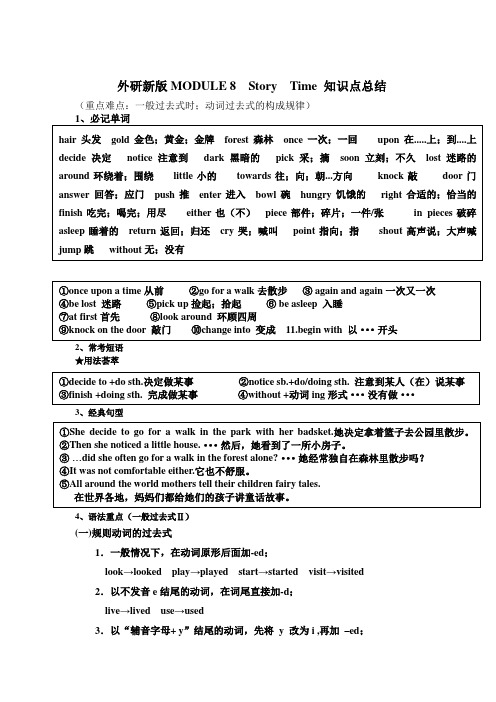
外研新版MODULE 8 Story Time 知识点总结(重点难点:一般过去式时;动词过去式的构成规律)2、常考短语★用法荟萃3、经典句型4、语法重点(一般过去式Ⅱ)(一)规则动词的过去式1.一般情况下,在动词原形后面加-ed ;look →looked play →played start →started visit →visited2.以不发音e 结尾的动词,在词尾直接加-d;live →lived use →used3.以“辅音字母+ y ”结尾的动词,先将 y 改为i ,再加 –ed ;study→studied, tr y→tried fly→flied4.以重读闭音节(即辅音+元音+辅音)或r音节结尾,末尾只有一个辅音字母的动词,要先双写这个辅音字母后,再加–ed。
stop→stopped plan→planned, prefer→preferred(二)一般过去时的否定句谓语动词为行为动词时,一般过去时的否定的构成为:主语+didn’t(did not)+动词原形(+其他)We didn’t go to school yeaterday.昨天我们没有去上学。
They didn’t stop working.他们没有停止工作。
He didn’t eat breakfast this morning.今天早上他没有吃餐。
★注意MODULE 8综合测试题一、单项填空。
(20分)( )1. Mary__________ her homework, but Mike did.A. didn’t doB. doesn’t doC. will doD. is doing( )2.-Did your father work in America in 2000?-__________ He worked in France.A. No, he doesn’tB. Yes, he doesC. No, he didn’tD. Yes, he did( )3. July is the__________ month of the year.A. fourthB. ninthC. eighthD. Seventh( )4. Last year a new__________ opened in the city and many interesting moves were on in it.A. companyB. storeC. movie theaterD. TV station( )5. When I was ten years old, I started__________ English and now I learn it well.A. writingB. teachingC. knowingD. learning( )6. -My brother is going to Sanya.-__________Two years ago I went there and had a great time.A. You’ll like it .B. He’ll like it.C. He needed to go there.D. It’ll be a bad trip.( )7. -__________ did you stay in your hometown?-For two weeks.A. How oftenB. How longC. How manyD. How many times( )8. Peter was very__________ . He finished all the food on the table quickly.A. angryB. happyC. unhappyD. hungry( )9. It’s di fficult__________ a house like that, so they wanted a best engineer.A. to buildB. buildingC. to haveD. having( )10. Tony is__________. He says hello to everyone.A. strictB. naughtyC. unfriendlyD. friendly二、完形填空。
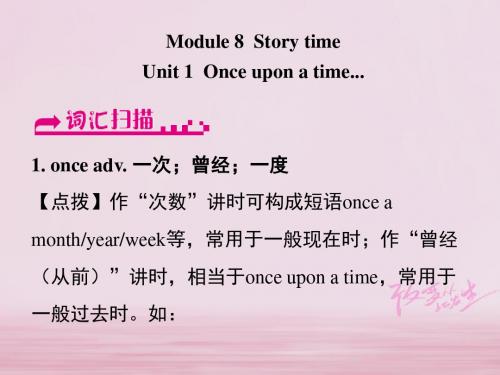

Module 8____________________________________________________________________________________________________________________________________________________________一般过去时(2)规则动词的一般过去时一般过去时表示过去某一时间发生的动作或存在的状态、过去的特征、过去的行为等。
和一般过去时连用的时间状语有:last...\yesterday\....ago\in the past\the other day\at that time\just now\in 1990等。
如:I was born in 2000.He went to the museum yesterday.We climbed the mountain last week.规则动词过去式的变化规则一般过去时的肯定、否定、疑问和回答方式的变化如下:It rained heavily. It didn’t (didn’t)rainheavily.Did it rain heavily? Yes, it did.No, it didn’t. We played footballyesterday.We didn’t (didn’t) playfootball yesterday.Did we play footballyesterday?Yes, we did .No, we didn’t. They playedbasketball lastweek.They didn’t (didn’t)play basketball last week.Did they playbasketball last week?Yes, they did.No, they didn’t.单项选择1.I __________tennis yesterday.A. playB. will playC. playedD. are playing 答案:C解析:考查一般过去时,根据yesterday可知答案是C。
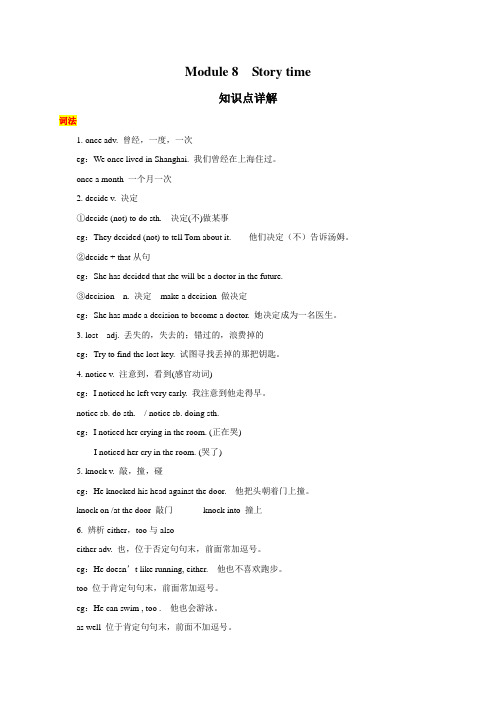
Module 8 Story time知识点详解词法1. once adv. 曾经,一度,一次eg:We once lived in Shanghai. 我们曾经在上海住过。
once a month 一个月一次2. decide v. 决定①decide (not) to do sth. 决定(不)做某事eg:They decided (not) to tell Tom about it. 他们决定(不)告诉汤姆。
②decide + that从句eg:She has decided that she will be a doctor in the future.③decision n. 决定make a decision 做决定eg:She has made a decision to become a doctor. 她决定成为一名医生。
3. lost adj. 丢失的,失去的;错过的,浪费掉的eg:Try to find the lost key. 试图寻找丢掉的那把钥匙。
4. notice v. 注意到,看到(感官动词)eg:I noticed he left very early. 我注意到他走得早。
notice sb. do sth. / notice sb. doing sth.eg:I noticed her crying in the room. (正在哭)I noticed her cry in the room. (哭了)5. knock v. 敲,撞,碰eg:He knocked his head against the door. 他把头朝着门上撞。
knock on /at the door 敲门knock into 撞上6. 辨析either,too与alsoeither adv. 也,位于否定句句末,前面常加逗号。
eg:He doesn’t like running, either. 他也不喜欢跑步。
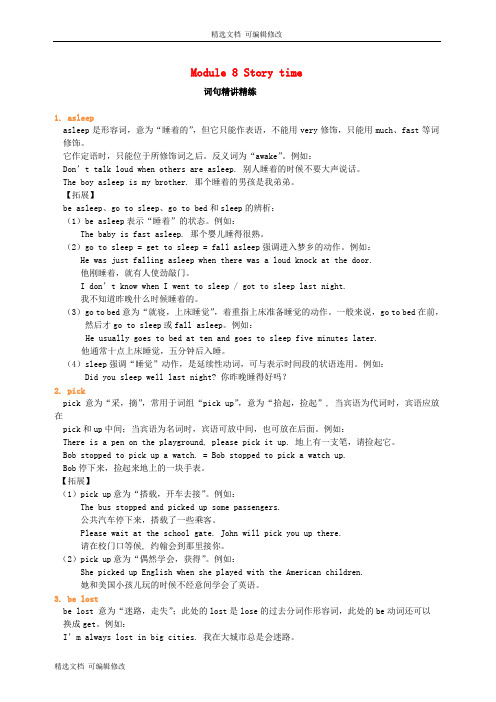
Module 8 Story time词句精讲精练1. asleepasleep是形容词,意为“睡着的”,但它只能作表语,不能用very修饰,只能用much、fast等词修饰。
它作定语时,只能位于所修饰词之后。
反义词为“awake”。
例如:Don’t talk loud when others are asleep. 别人睡着的时候不要大声说话。
The boy asleep is my brother. 那个睡着的男孩是我弟弟。
【拓展】be asleep、go to sleep、go to bed和sleep的辨析:(1)be asleep表示“睡着”的状态。
例如:The baby is fast asleep. 那个婴儿睡得很熟。
(2)go to sleep = get to sleep = fall asleep强调进入梦乡的动作。
例如:He was just falling asleep when there was a loud knock at the door.他刚睡着,就有人使劲敲门。
I don’t know when I went to sleep / got to sleep last night.我不知道昨晚什么时候睡着的。
(3)go to bed意为“就寝,上床睡觉”,着重指上床准备睡觉的动作。
一般来说,go to bed在前,然后才go to sleep或fall asleep。
例如:He usually goes to bed at ten and goes to sleep five minutes later.他通常十点上床睡觉,五分钟后入睡。
(4)sleep强调“睡觉”动作,是延续性动词,可与表示时间段的状语连用。
例如:Did you sleep well last night? 你昨晚睡得好吗?2. pickpick意为“采,摘”,常用于词组“pick up”,意为“拾起,捡起”, 当宾语为代词时,宾语应放在pick和up中间;当宾语为名词时,宾语可放中间,也可放在后面。
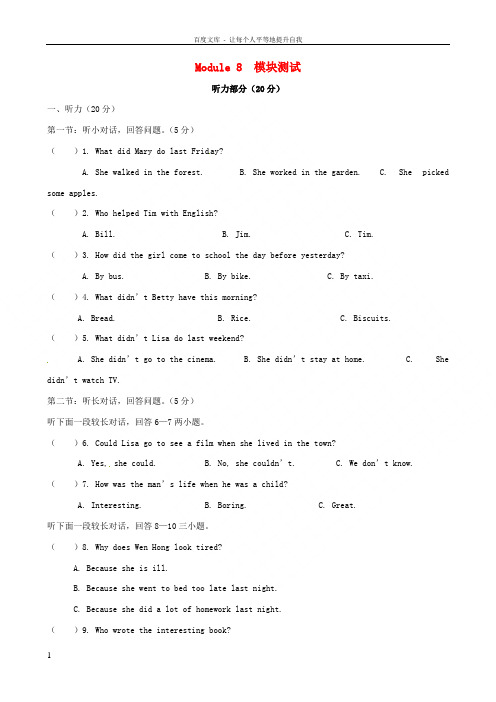
Module 8 模块测试听力部分(20分)一、听力(20分)第一节:听小对话,回答问题。
(5分)()1. What did Mary do last Frid ay?A. She walked in the forest.B. She worked in the garden.C. She picked some apples.()2. Who helped Tim with English?A. Bill.B. Jim.C. Tim.()3. How did the girl come to school the day before yesterday?A. By bus.B. By bike.C. By taxi.()4. What didn’t Betty have this morning?A. Bread.B. Rice.C. Biscuits.()5. What didn’t Lisa do last weekend?A. She didn’t go to the cinema.B. She didn’t stay at home.C. She didn’t watch TV.第二节:听长对话,回答问题。
(5分)听下面一段较长对话,回答6—7两小题。
()6. Could Lisa go to see a film when she lived in the town?A. Yes, she could.B. No, she couldn’t.C. We don’t know.()7. How was the man’s life when he was a child?A. Interesting.B. Boring.C. Great.听下面一段较长对话,回答8—10三小题。
()8. Why does Wen Hong look tired?A. Because she is ill.B. Because she went to bed too late last night.C. Because she did a lot of homework last night.()9. Who wrote the interesting book?A. Mark Twain.B. Andersen.C. Mo Yan.()10. What’s Tony’s favourite book?A. Red and Black.B. The Ugly Duckling.C. The Red Shoes.第三节:听独白,完成信息记录表。
Module 8 Story time语法精选1. pick 采;摘(1)pick作动词,意为“采;摘”。
如:You should not pick any of the flowers in the park.你不应该采摘这个公园里的任何一朵花。
(2)常构成词组pick up,表示“拿起;捡起”。
当拿起的东西为名词时,可以放在pick和up之间,也可以放在up后面;但如果是代词,则必须放在两者中间。
如:①Pick up the bag on the floor.把地板上的包拿起来。
②The wallet on the floor is yours, pick it up.地板上的钱包是你的,把它捡起来。
2. asleep与go to bedasleep是形容词,表示“睡着了”,强调状态,常与系动词连用作表语;而go to bed 是动词短语,表示“去睡觉”,只是强调行为,但不一定表示“睡着了”。
如:①What time do you go to bed every night?你每天晚上几点睡觉?②The children are asleep in the car.孩子们在车上睡着了。
3. right 合适的;恰当的right作形容词,意为“合适的;恰当的”。
常与 just连用,构成just right,意为“正好合适”。
right作形容词,还有两个常见的意思:(1)意为“正确的;对的”。
反义词是wrong,意为“错误的”。
如:You are right and I am wrong.你是对的,我是错的。
(2)意为“右边的;右面的”。
反义词是left,意为“左边的;左面的”。
如:You are right, and I am left.你在右边而我在左边。
句法精析1. Once upon a time, there was a...从前有一个……这个句型常用于故事的开头。
如:Once upon a time, there was a king.从前有一位国王。
Module 8 Story time语法精选1. pick 采;摘(1)pick作动词,意为“采;摘”。
如:You should not pick any of the flowers in the park.你不应该采摘这个公园里的任何一朵花。
(2)常构成词组pick up,表示“拿起;捡起”。
当拿起的东西为名词时,可以放在pick和up之间,也可以放在up后面;但如果是代词,则必须放在两者中间。
如:①Pick up the bag on the floor.把地板上的包拿起来。
②The wallet on the floor is yours, pick it up.地板上的钱包是你的,把它捡起来。
2. asleep与go to bedasleep是形容词,表示“睡着了”,强调状态,常与系动词连用作表语;而go to bed 是动词短语,表示“去睡觉”,只是强调行为,但不一定表示“睡着了”。
如:①What time do you go to bed every night?你每天晚上几点睡觉?②The children are asleep in the car.孩子们在车上睡着了。
3. right 合适的;恰当的right作形容词,意为“合适的;恰当的”。
常与 just连用,构成just right,意为“正好合适”。
right作形容词,还有两个常见的意思:(1)意为“正确的;对的”。
反义词是wrong,意为“错误的”。
如:You are right and I am wrong.你是对的,我是错的。
(2)意为“右边的;右面的”。
反义词是left,意为“左边的;左面的”。
如:You are right, and I am left.你在右边而我在左边。
句法精析1. Once upon a time, there was a...从前有一个……这个句型常用于故事的开头。
如:Once upon a time, there was a king.从前有一位国王。
’t第八模块:M8:Story timeM8U1:1. once upon a time = long long ago “从前” 拓展:once 的用法(1)副词,“一次;一回”。
I go to the movies once a month.我一个月去看一次电影。
(2)副词,“曾经;一度”。
We once lived in the small village. 我们曾经在这个小乡村里住过。
(3)常见表达有:①once or twice 一两次;偶尔;②at once 立刻;马上; ③once more 再一次 2.decide 的用法(1)decide (not) to do sth. “决定(不)做某事” They decided not to tell Tom about the news. 他们决定不告诉汤姆这条消息。
(2)decide on (doing) sth. “决定(做)某事” They decide on going shopping this weekend. 他们决定这个周末去购物。
(3)decide + 疑问词 + to do sth. “决定......做某事”There are so many nice mobile phones in the store.I can decide which one to buy.这家手机店有如此多的精美手机,我不能决定该买那一款手机。
(4)decide + that 从句Tom decided that he would stay with us in the village. (5)make a decision (名词) to do sth.“决定去做某事”= make up one’s mind to do sth. “下定决心去做某事”3.go for... “去进行......;去参加、从事(某项活动或运动)”,类似表达有:(1)go for a walk = take/have a walk 去散步 (2)go for a ride “去骑马;去兜风”(3)go for a swim “去游泳”“(4)go for a trip “去旅行”(5)go for a picnic “去野餐”(6)go for a drive “开车出游”4.be/get lost = lose one’s way “迷路” lost and found office/box 失物招领处/箱5.look around “环顾四周,向四周看” 与 look 相关的短语:(1)look at 看 (2)look for 寻找 (3)look after 照顾 (4)look up 往上看;查找 (5)look down 往下看 (6)look out 往外看;当心 (7)look like 看起来像(8) look over 仔细检查 (9)look forward to 盼望;期待6.notice 的用法 (1)动词,“注意到”。
七年级英语下册Module 8 Story time Unit 1 Once upon a time…说课稿一. 教材分析《英语》七年级下册Module 8 Story time Unit 1的主题是“Once upon a time…”,讲述了三个小红帽的故事。
这是一个充满趣味性的故事,旨在让学生在轻松愉快的氛围中学习英语。
通过对这个故事的学习,学生可以提高他们的阅读理解能力,增强他们的词汇量和语法知识,同时也能提高他们的听说能力和团队协作能力。
二. 学情分析在七年级的学生中,大部分学生已经掌握了基本的英语语法和词汇,对英语学习有了一定的兴趣和热情。
然而,由于语言环境的限制,学生的听说能力还有待提高,部分学生在阅读和写作方面还存在困难。
因此,在教学过程中,我们需要关注学生的个体差异,因材施教,尽量让每个学生都能在课堂上得到锻炼和提高。
三. 说教学目标根据新课程标准,本节课的教学目标如下:1.学生能够理解并朗读故事,掌握故事中的主要词汇和语法知识。
2.学生能够通过故事学习,提高他们的阅读理解和听说能力。
3.学生能够运用所学知识,进行简单的口语交流和写作练习。
4.学生能够激发对英语学习的兴趣,培养良好的学习习惯。
四. 说教学重难点本节课的重难点如下:1.故事中涉及的一些新词汇和短语的理解和运用。
2.一般过去时的语法知识,如was/were的运用。
3.学生能够正确朗读和模仿故事中的角色,提高他们的听说能力。
五. 说教学方法与手段在教学过程中,我会采用任务型教学法,让学生在完成任务的过程中学习英语。
同时,我会运用多媒体教学手段,如PPT、视频等,为学生提供直观、生动的学习材料,激发学生的学习兴趣。
六. 说教学过程1.导入:通过展示一幅图片,引导学生谈论图片中的内容,引出本节课的主题。
2.自主学习:让学生自主阅读故事,理解故事内容,掌握新词汇和短语。
3.合作学习:学生分组讨论,分析故事中的语法知识,如一般过去时。
Module 8 Story time语法精选1. pick 采;摘(1)pick作动词,意为“采;摘”。
如:You should not pick any of the flowers in the park.你不应该采摘这个公园里的任何一朵花。
(2)常构成词组pick up,表示“拿起;捡起”。
当拿起的东西为名词时,可以放在pick和up之间,也可以放在up后面;但如果是代词,则必须放在两者中间。
如:①Pick up the bag on the floor.把地板上的包拿起来。
②The wallet on the floor is yours, pick it up.地板上的钱包是你的,把它捡起来。
2. asleep与go to bedasleep是形容词,表示“睡着了”,强调状态,常与系动词连用作表语;而go to bed 是动词短语,表示“去睡觉”,只是强调行为,但不一定表示“睡着了”。
如:①What time do you go to bed every night?你每天晚上几点睡觉?②The children are asleep in the car.孩子们在车上睡着了。
3. right 合适的;恰当的right作形容词,意为“合适的;恰当的”。
常与 just连用,构成just right,意为“正好合适”。
right作形容词,还有两个常见的意思:(1)意为“正确的;对的”。
反义词是wrong,意为“错误的”。
如:You are right and I am wrong.你是对的,我是错的。
(2)意为“右边的;右面的”。
反义词是left,意为“左边的;左面的”。
如:You are right, and I am left.你在右边而我在左边。
句法精析1. Once upon a time, there was a...从前有一个……这个句型常用于故事的开头。
如:Once upon a time, there was a king.从前有一位国王。
2. She decided to go for a walk in the park with her basket.她决定拿着她的篮子到公园里散步。
decide作及物动词,意为“决定”。
常用结构:decide to do sth.;decide+that从句;decide+疑问词+to do。
如:①At first, they decided to go to the Great Wall.起先,他们决定去长城。
②They decided that Tom must stay there.他们决定汤姆必须留在那里。
③He could not decide what to do next.他不能决定下一步该做什么。
语法精讲一般过去时(二)行为动词的一般过去时(1)当我们谈论过去的动作或状态时,常常使用一般过去时,句中的谓语动词要用过去式。
如:Jack often goes to school by bike, but today he walked to school.杰克经常骑自行车去学校,但是今天他是步行去学校的。
(2)行为动词的一般过去式变化规则,如下表:-ed hurr试题精编一、根据句意及汉语提示完成句子1. Don’t (高声说)!We need to be quiet.2. Mary, please bring me a (张) of paper.3. When he saw his mother, the boy began to (哭).4. Look!The monkey is (跳) up and down.5. Our teacher is (指) at the map on the wall.6. She (匆忙) to the house to ask where she was.7. —How was the weather yesterday?—It was (有雨的).8. Goldilocks wanted to (坐) down because she was tired.9. It was nice, but Goldilocks was very heavy and she (弄破) it.10. She was (不快乐的) and tired.二、用be动词的适当形式填空1. I an English teacher now.2. She happy yesterday.3. They glad to see each other last month.4. Helen and Nancy good friends.5. The little dog two years old last year.三、用所给词的适当形式填空1. Mary often (go) to the supermarket by bike, but today she (walk)to it.2. I in Beijing now, but I in Shanghai three years ago. (live)3. Alice often her homework at eight o’clock, but she it at nine o’clock last night. (finish)4. Baby Bear (not notice) the little girl in his bed.5. Becky went to school (with) having breakfast this morning.四、句型转换1. I did my homework at home yesterday evening. (改为否定句)I my homework at home yesterday evening.2. He played football this morning. (改为一般疑问句,并作肯定回答)— he football this morning?— , he .3. Barry visited his uncle last week. (对画线部分提问)Barry last week?4. Tony left the house. He didn’t say any words. (合并为一句)Tony left the house any words.5. There was nobody in the room. (改为同义句)There in the room.五、语法填空阅读下面短文,按照句子结构的语法性和上下文连贯的要求,在空格处填入一个适当的词或使用括号中词语的正确形式填空(每空不多于2个单词)。
One day, a rich boy bought a magic mirror(魔镜). When he got home, he looked in the mirror.His face looked sad. He 1 (try) to smile(微笑) and make funny faces. His face lookedstill sad.“Oh, 2 a terrible mirror!It 3 (not) wor k!” he said angrily.The next day, on his way home, he saw a little girl 4 (cry) sadly. The rich b oywent up to her and asked 5 had happened. The little girl said she couldn’t find her parents.“6 (not) worry. I’ll help you,” the rich boy said. So they went to look for 7 (they) together. 8 (final), they found her parents. They thanked the boy a lot. Afterthe rich boy arrived home, he looked in9 mirror as usual. To his surprise, his face lookedvery happy. The boy knew the magic of the mirror.This was true—the rich boy had helped that little girl, 10 he felt really happy.参考答案Module 8一、1. shout 2. piece 3. cry 4. jumping 5.pointing6. hurried7. rainy8. sit9. broke 10. unhappy/sad二、1. am 2. was 3. were 4. are 5. was三、1. goes, walked 2. live, lived 3.finishes, finished 4. didn’t notice 5. without四、1. didn’t do 2. Did, play, Yes, did 3. Who did, visit 4. without saying5. wasn’t anybody五、1. tried 2. what 3. doesn’t 4. crying 5.what6. Don’t7. them8. Finally9. the 10. so。